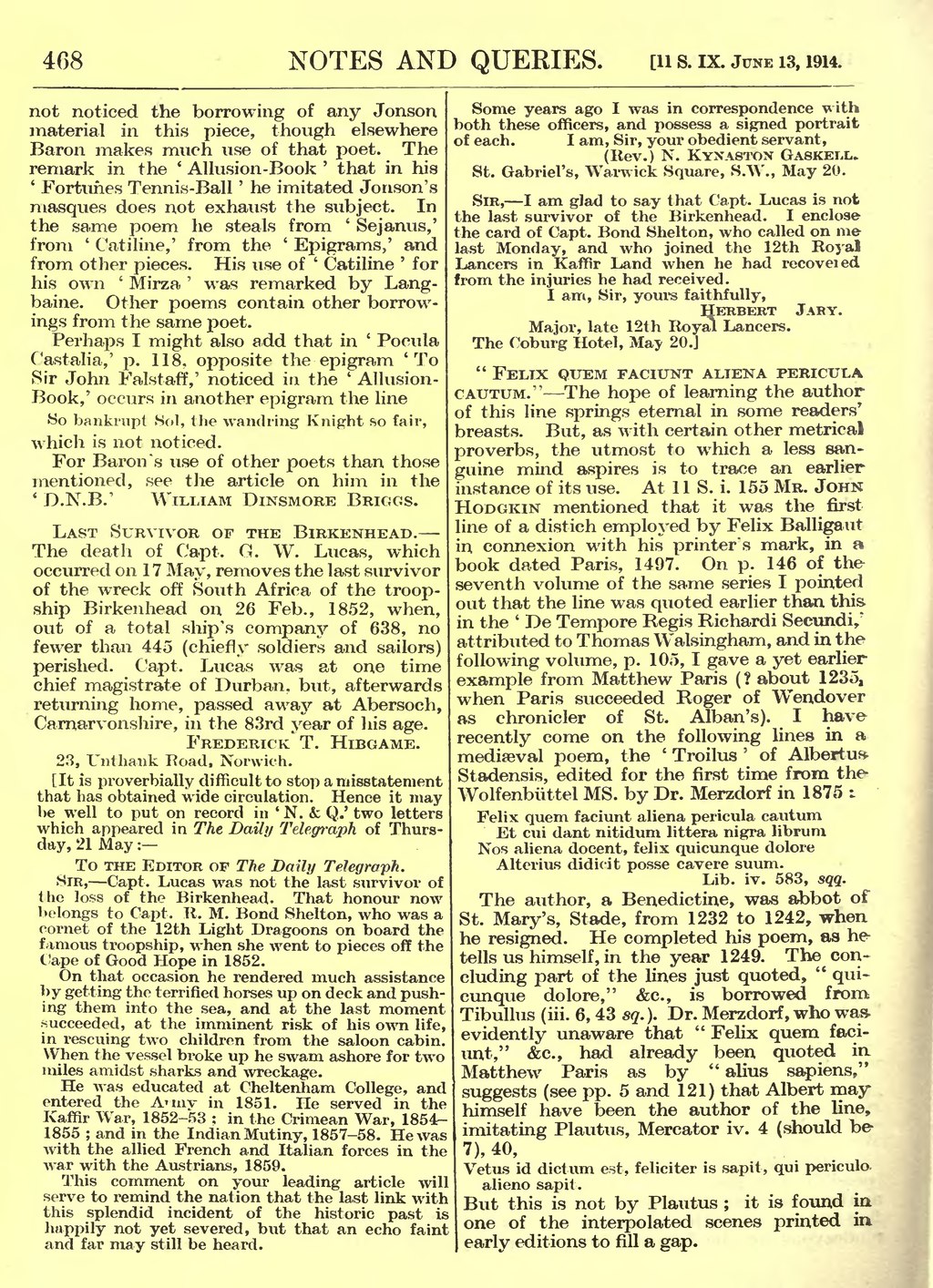468
NOTES AND QUERIES. [ii s. ix. JUNE 13, WM.
not noticed the borrowing of any Jonson
material in this piece, though elsewhere
Baron makes much vise of that poet. The
remark in the * Allusion-Book ' that in his
- Fortunes Tennis-Bali ' he imitated Jorison's
masques does not exhaust the subject. In the same poem he steals from ' Sejanus,' from ' Catiline,' from the ' Epigrams,' and from other pieces. His use of ' Catiline ' for his own ' Mirza ' was remarked by Lang- baine. Other poems contain other borrow- ings from the same poet.
Perhaps I might also add that in ' Pocula Castalia,' p. 118, opposite the epigram 'To Sir John Falstaff,' noticed in the ' Allusion- Book,' occurs in another epigram the line
So bankrupt Sol, the wand ring Knight so fair, which is not noticed.
For Baron's use of other poets than those mentioned, see the article on him in the ' D.N.B.' WILLIAM DINSMOBE BRIGGS.
LAST SURVIVOR OF THE BIRKENHEAD. The death of Capt. G. W. Lucas, which occurred on 1 7 May, removes the last survivor of the wreck off South Africa of the troop- ship Birkenhead on 26 Feb., 1852, when, out of a total ship's company of 638, no fewer than 445 (chiefly soldiers and sailors) perished. Capt. Lucas was at one time chief magistrate of Durban, but, afterwards returning home, passed away at Abersoch, Carnarvonshire, in the 83rd year of his age. FREDERICK T. HIBGAME.
23, Unthank Road, Norwich.
[It is proverbially difficult to stop a niisstatement that has obtained wide circulation. Hence it may be well to put on record in ' N. & Q.' two letters which appeared in The Daily Telegraph of Thurs- day, 21 May :
To THE EDITOR OF The Daily Telegraph.
SIR, Capt. Lucas was not the last survivor of the loss of the Birkenhead. That honour now belongs to Capt. R. M. Bond Shelton, who was a cornet of the 12th Light Dragoons on board the famous troopship, when she went to pieces off the Cape of Good Hope in 1852.
On that occasion he rendered much assistance by getting the terrified horses up on deck and push ing them into the sea, and at the last moment succeeded, at the imminent risk of his own life, in rescuing two children from the saloon cabin. When the vessel broke up he swam ashore for two miles amidst sharks and wreckage.
He was educated at Cheltenham College, and entered the Amiy in 1851. He served in the Kaffir War, 1852-53 ; in the Crimean War, 1854- 1855 ; and in the Indian Mutiny, 1857-58. He was with the allied French and Italian forces in the war with the Austrians, 1859.
This comment on your leading article wil serve to remind the nation that the last link with this splendid incident of the historic past is happily not yet severed, but that an echo faint and far may still be heard.
Some years ago I was in correspondence with
both these officers, and possess a signed portrait
)f each. I am, Sir, your obedient servant,
(Rev.) N. KYNASTOX GASKELL.
St. Gabriel's, Warwick Square, S.W., May 20.
SIR, I am glad to say that Capt. Lucas is not
- he last survivor of the Birkenhead. I enclose-
he card of Capt. Bond Shelton, who called on me ast Monday, and who joined the 12th Royal Liancers in Kaffir Land when he had recoveied 'rom the injuries he had received.
I am, Sir, yours faithfully,
HERBERT JARY. Major, late 12th Royal Lancers. The Coburg Hotel, May 20.]
" FELIX QUEM FACIUNT ALIENA PERICULA
CAUTUM." The hope of learning the author of this line springs eternal in some readers' Dreasts. But, as with certain other metrical proverbs, the utmost to which a less san- ruine mind aspires is to trace an earlier nstance of its use. At 1 1 S. i. 155 MR. JOHN HODGKIN mentioned that it was the first ine of a distich employed by Felix Balligaut n connexion with his printer's mark, in a book dated Paris, 1497. On p. 146 of the seventh volume of the same series I pointed out that the line was quoted earlier than this, in the ' De Tempore Regis Richardi Seciuidi/ attributed to Thomas Walsingham, and in the following volume, p. 105, 1 gave a yet earlier example from Matthew Paris (? about 1235, when Paris succeeded Roger of Wendover as chronicler of St. Alban's). I have recently come on the following lines in a mediaeval poem, the ' Troilus ' of Albertu* Stadensis, edited for the first time from the Wolfenbiittel MS. by Dr. Merzdorf in 1875 :
Felix quern faciunt aliena pericula cautum Et cui dant nitidum littera nigra librum
Nos aliena decent, felix quicunque dolore Alterius didicit posse cavere suum.
Lib. iv. 583, sqq.
The author, a Benedictine, was abbot of St. Mary's, Stade, from 1232 to 1242, when he resigned. He completed his poem, as he tells us himself, in the year 1249. The con- cluding part of the lines just quoted, " qui- cunque dolore," &c., is borrowed from; Tibullus (hi. 6, 43 sq.). Dr. Merzdorf, who was- evidently unaware that " Felix quern faci- unt," &c., had already been quoted in. Matthew Paris as by " alius sapiens," suggests (see pp. 5 and 121) that Albert may himself have been the author of the line, imitating Plautus, Mercator iv. 4 (should be 7), 40, Vetus id dictum est, feliciter is sapit, qui periculo-
alieno sapit.
But this is not by Plautus ; it is found in one of the interpolated scenes printed in early editions to fill a gap.
